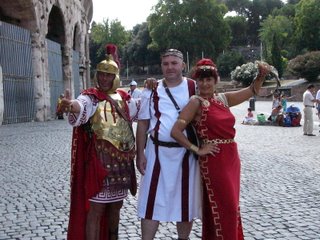TAPAE 87 AC.
The first important confruntation between the Romans and the Dacians, took place in the year 87 and was initiated by Domitian. The praetorian prefect Cornelius Fuscus led five or six legions across the Danube on a bridge of ships and advanced towards Banat. The Romans were surprised by a Dacian attack at Tapae. Legion V Alaude was crushed and Cornelius Fuscus was killed. In the year 88, the Romans resumed the offensive. The Roman troops were now led by the general Tettius Iulianus. The battle took place again at Tapae but this time the Romans defeated the Dacians.
***
FUSCUS AT TAPAE
Each morning when he awakes
Fuscus fetches his armor,
Dutifully, as each and every time
Then, now, like any soldier.
Then his eyes look over the field on which
Rocks and trees, arrows and stones lay
Ordered in a way so difficult to understand
Still the same, after so many years.
The actant of an eternal ritual
Looking at his harsh hands, he comes
And stone by stone, rock by rock
He carefully places them where they belong in the mountain.
And with every stone, every log
Another comrade shows himself from behind the clouds
And Fuscus’ heart beats faster and faster
While his soul mourns for them.
Confident and fiery he carves his steps in the stones
Up and down and going up and down again
With his back bending,
His brow almost touching the earth.
The dacians are used to his presence
They almost do not mind him,
They are as he is wandering shadows on a battlefield
Living their drama until the dusk.
One winter they gave him a warm fur
To cover his body against the cold.
And they gave him a wood mace carved with ancestral signs
To be helpful on his never-ending path.
And so tries Fuscus to rebuild his dream
With every stone he gives back to the mountain
The legion comes back to life and with their shields raised
They hail, friendly salute him.
In the evening they gather there, strange shadows
All those with whom he had began his journey
And others come whom he doesn’t even know
Form his legion or maybe from Tetius’s.
As in a perpetual legend everything is placed and settled
And each morning it begins again
A different Sisyphus here in the Valley of Cerna ,
The hero of a myth which he did not trust while being alive.
Only one vision remains when in the evening
He sits down tired and looks at the horizon
Far away, from Ulpia to Forum, upon the scattered ruins
Till the church made up from of them from Densus.
There, sitting still on the walls, with the cup in his hand
Longinus is drinking his poison
Brought by a messenger from Trajan .
***
english translation : Iulia Caesar Cytheris Aege.
***
Fuscus la Tapae
In fiecare dimineata cand se trezeste,
Fuscus, isi pregateste tot echipamentul
Constiincios, la fel ca de fiecare data,
Atunci, acum, asemeni unui simplu soldat.
Apoi priveste campul intins, pe care,
Stanci si copaci, sageti si pietre
Zac, aranjate dupa o logica neinteleasa,
Dar totusi aceeasi, dupa atatia ani.
Personaj principal al unui etern ritual
Privindu-si mainile aspre, se indreapta,
Si piatra cu piatra, stanca cu stanca,
Le aseaza cu grija la locul lor din munte.
Cu fiecare piatra, cu fiecare trunchi,
Un alt camarad apare undeva in nori
Si Fuscus simte cum inima mai tare-i bate
In timp ce sufletu-i plange, de dorul lor.
Hotarit si aprig isi taie pasii-n piatra
Urcand, coborand si iar urcand si coborand
In timp ce spatele i se-nconvoaie si,
Aproape ca ajunge cu fruntea la pamant.
Dacii din zona s-au obisnuit de mult cu el,
Aproape ca nu-l baga-n seama,asemeni lui,
Si ei umbre ratacitoare ale unui camp de lupta
Ce-si traieste drama pana la apusul soarelui.
Ba chiar intr-o iarna i-au dat o blana groasa
Sa-si inveleasca trupul, sa nu-i mai fie frig
Si un toiag cioplit in lemn cu semne ancestrale
Sa-i fie sprijin in drumu-i nesfarsit de lung.
Asa incearca Fuscus sa-si recladeasca visul
Cu fiecare piatra dusa cu greu inapoi pe munte
Legiunea-i iar reinvie, si sprijiniti in scuturi
Ii fac apoi cu mina , prietenesc semn de salut.
Se-aduna pana seara, acolo, stranii umbre
Toti acei cu care a pornit de mult la drum.
Apar si altii, pe care nici macar nu-i stie
Ai lui, sau poate din ale lui Tettius legiuni.
Ca intr-o perpetua legenda, insa dimineata,
Totul e la loc si hotarat o ia de la inceput.
Un alt fel de Sisif, de aici din Valea Cernei,
Erou al unui mit in care cand traia nu a crezut.
O singura viziune i-a ramas cand pe seara,
Se-aseaza ostenit de truda sa priveasca-n zare
Departe,de la Ulpia si Forum, prin ruine,
Pana spre biserica zidita din ele la Densus.
Acolo, neclintit pe ziduri, in mana c-un pocal
Isi bea Longinus neincetat otrava
Adusa de-un libert de-al lui Traian.
















